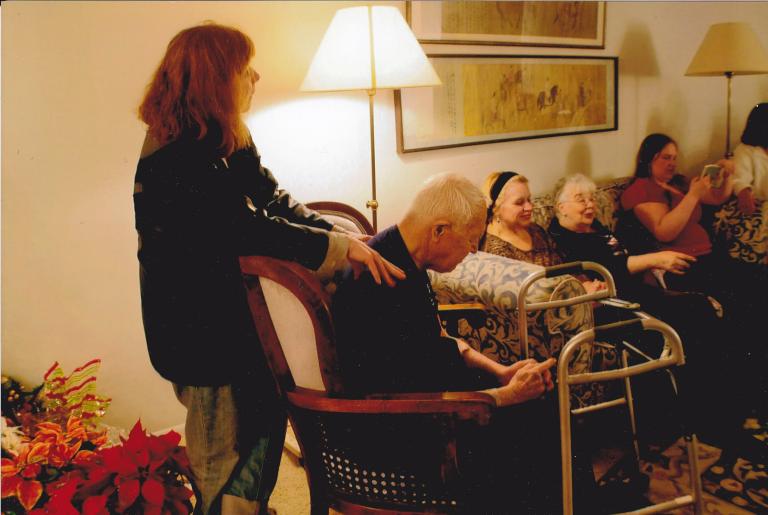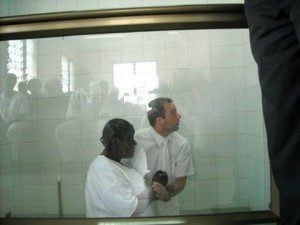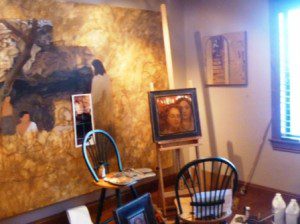Editors’ Note: This article is part of the Public Square 2014 Summer Series: Conversations on Religious Trends. Read other perspectives from the Mormon community here.

We learn narratives from our parents. These narratives are sometimes harsh and sometimes fantastical. They go from “you can’t trust anyone” to “Santa will come tonight!” and beyond. If we believe that we can’t trust anyone, we soon learn that it’s true, because we don’t trust anyone and we pay particular notice when someone is untrustworthy. The Santa Claus myth is more gently replaced by a realization that parents want to create magical moments for their children.
In Mormonism, the narratives get more complicated. There are two competing narratives I see repeated over and over on Facebook, and neither is fully true. (Actually, no narrative is fully true. Each of us sees things differently, interprets things differently, processes information through our own biases and cultures, including family cultures.)
The first narrative suggests that God is unchanging, but because particular teachings or ordinances have changed in the Church, they violate the concept of unchangeability and therefore aren’t of God. The premise is naïve, of course, and assumes first, that we understand God—who, by definition, is incomprehensible, and second, that God and the Church are one in the same; that all was revealed in the early days of Mormondom and we are current with God in 2014. It usually includes an assumption that prophets and apostles hold frequent communication with Christ and are instructed in all things and should not err. Consequently, discovering that they have erred in the past is a faith killer. This either/or narrative in its full trajectory suggests that the Church has always been a nefarious lie—not a nice lie like Santa Claus—and that Mormons are simply duped and dumb. Because there are various versions of the First Vision, we can trust none of them. Because the Church statement on race and the priesthood is contrary to what we who are old enough to remember were taught about the priesthood restriction, we were intentionally lied to by people who knew but hid the truth. (No. The leaders are not usually historians. They need to seek knowledge by study as well as by faith, as do the rest of us.)
The second narrative is full of indignation. The voices behind it pronounce the names of prophets and apostles as though James Earl Jones were enunciating each syllable. It insists that we say nothing which could question the “orthodox gospel.” It is the “Choose your side” narrative and can be deadly in its suggestion of SIDES, since some may use the dividing point as permission to speak ill not of ecclesiastical leaders but of those who question or struggle. It can lead away from the wells of charity into the dangerous elevation of elitism. As a further consequence, it can make those who are sincerely questioning feel that they don’t fit into a church of such certainty, that if they speak up, they will be summarily judged.
When I spoke to a friend recently who is questioning his faith and no longer feels comfortable at church or in the temple, I suggested that he find his own sacred grove and nurture spiritual feelings while the faith issues work themselves out. This person finds spiritual comfort through music, which can lead to spiritual awakening. Songs ranging from “Lead Kindly Light” to “O Happy Day!” can touch us with a sense of the divine and help us seek truth without the burden and pollutant of anger. The statement, “I have been deceived!” is full of anger. If it becomes the starting premise for a spiritual journey, the journey will end in a tempest of rage. There are always other angry people to support angry statements, and those who phrase their fury cleverly are often rewarded by words like “courageous” and “unflinching.” There will always be angry communities. Even if we feel anger is justified, I would urge all of us to ponder the words of Desmond Tutu: “Each act of forgiveness, whether small or great, moves us closer to wholeness.” Consider that statement with the Savior’s poignant question: “Wilt thou be made whole?”
The statements, “I have been loved!” or “I have been forgiven!” lead away from anger, and tend to come in private, reflective, redemptive moments.
I, Margaret Blair Young, have been loved by parents who were faithful to each other and to their beliefs. I have been loved and protected by God. My testimony is not founded in objective fact—which might exist in mathematics but is rare in religion—but in joy and love, which are the fruits of the Spirit. Such feelings let me know that I’m in tune with the divine. As I continue on my spiritual journey, I do see miracle after miracle, which I would not see (and perhaps would not receive) were I whirling in the winds of anger. Anger always confuses perspective and direction and becomes its own tempestuous support—the hurricane under the large and spacious building.
Years ago, when I encountered the awful statements on race by church leaders I remembered or who I had learned about, I was completely taken aback. My co-author, Darius Gray, called me as if on cue. “You’ve been reading some hard things. I felt like I needed to bear you my testimony,” he said. He then repeated his conversion story, which culminated in his hearing an actual voice telling him, “This is the restored gospel, and you are to join.” He has held to that declaration since that day in 1964. It is the foundation of his personal version of Mormonism. For me, the understanding that racism infected Mormonism just as it infected America is foundational to my belief that we can heal. We as a Church can show the world that the worst and most divisive teachings and shared beliefs may be overcome, not only individually but culturally and institutionally. We have not yet become that shining example, but we are on our way, largely through missionary efforts which pair young people with companions from all over the world and ask them to love each other. That love and the service which comes with it create the future.
As to the question of the day—that gender question—I predict, under no authority whatsoever, that we will see significant change and growth over the next twenty years. It will be slow, and those who will be a part of it must be patient and humble. I predict that we will see the ordination of women—but not in the way OW has framed it. I suspect that women will be ordained to a female order of the priesthood, and will be ordained—put into order–to carry out specific assignments. For me, the Divine Feminine is ORDAINED to nurture. This idea is something I have grown into. As a young person, I was antagonistic, argumentative, ready to debate just about anything. At least that’s how I appeared. Actually, I was deeply insecure but had a good vocabulary and used it as my shield. As I have grown and now find myself in my 60th year, revelatory instruction has urged me to flee from argument, to hold out my arms to those who are hurting, to prove my love before I prove my point. I have not always succeeded, but I know that I have been so instructed. I have dealt with difficult circumstances as a mother, but have felt supported in all of my trials—not just so that I could feel comforted, but so that I could comfort my children and bear them up.
The best image I have ever seen of the Divine Feminine is in the film Tree of Life. That woman, that grieving, graced, and graceful mother is the quintessence of how I view the Divine Feminine. I hope she is what I am becoming.

My own articles of faith are these:
I believe in Heavenly parents, a Heavenly Father and Mother; in Jesus Christ who is my exemplar, and in the Holy Ghost, whose peacemaking and consolation I have felt in my most difficult moments. I believe in the divine nature of all human beings, and honor all honest spiritual quests.
I believe in the restoration of the gospel of Jesus Christ in its essential points through Joseph Smith, flawed though he was. I believe that he did not fully understand his own prophetic gift, but that God was nonetheless able to work through him. I seek to hold to the core of that restored gospel and not to tarry in the cluttered suburbs.
I believe in visions and revelation. Though I have not had visions, I have many friends who have. I have had revelations which continue. I have had more miracles than I can count, and many which I likely didn’t recognize at the time.
I believe in the power of faith, which works by love, and in love, which casts out fear.
I believe in eternal progression, that “second chances” go beyond this life, that we continue to learn and to grow, and that our potential is infinite, even godly. I believe this “eternal progression” applies to the Church as well. I believe that the Church of Jesus Christ will, in the eternities, include all who choose to come unto Him regardless of what denomination they chose earlier. I know of no other Christian religion which holds such an expansive view of human and spiritual possibilities. We aren’t talking about equality but about glory.
I believe in the vision of Eve not as the cursed but as the courageous one who understood that we must pass through sorrow in order to grow. I think of Eve as figurative and symbolic of all women who listen not only to their husbands but to the word of the Lord, sometimes mediating between the two voices (which may be at odds) and thus helping to direct the companioned life.
I believe in the power of faith catalyzed by love as inherent in what we call the priesthood of God, though I do not pretend to understand the fullness of that priesthood.
I believe in the restorative power of the temple, though I recognize that it is not restorative for all. It is my sacred grove, where I leave the world for a time, where I become consciously still and so can feel the presence of the divine. I wear my temple garments with joy, and see them as the emblem of my own priesthood strength.
I believe in the power of church structure, that wards shepherded by imperfect men and women (I see both the bishop and the Relief Society president as shepherds) can provide community, aid, and instruction for all who seek a moral compass and friends to journey with. I would change many things about the manuals, the music, and the length of meetings, but I believe in the intrinsic value of the structures.
I believe in family as the basic church unit, and in our ability to learn the most essential lessons as children, parents, grandparents, aunts and uncles, brothers and sisters as we simply try to get along with one another.
I believe that the Church of Jesus Christ of Latter-day Saints is dynamic, that we are YOUNG, and currently experiencing a growth spurt which is at times ugly and sometimes embarrassing. We have pimples, and we are thinning out. Our coordination can be awkward, and we can say impetuous and thoughtless things. Nevertheless, we are growing into something magnificent. If we knew all of the stories from around the world of those who have joined the LDS community, we would be in awe of our fellow members and amazed by our privilege to associate with them.
I believe that the men and women who dedicate themselves to serving the Lord within the LDS structure are almost all sincere and are often inspired—more often than many suspect. They weary themselves to spread the good news of the gospel or to tend those who join the Mormon community wherever it may be, and they do it with little or no compensation. I cherish the volunteer aspect of the Church, and the fact that everyone is asked to do something to keep the community alive and loving. We fail sometimes. But if each does all that they can in the spirit of love, we arise again and move forward.
I believe that as I seek to identify everything “praiseworthy and of good report” within the Church, I will find it. I believe that when I find something less than praiseworthy, I should talk about it, but in the spirit of community and respect, not as gossip or with antagonism. I seek to focus on the lovely.
I proclaim my faith in this gospel. Here I stand as a committed member who will not be moved from this place. God help me, I can do no other.













